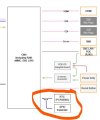Hi,
I have a device using Pi compute module 4, which seems to have a real time clock
(documentation shows pcf85063a). I wonder if there are any means to get it
working with FreeBSD ? I spent yesterday trying to figure this out and adding
things like
to config.txt does not really seem to do anything.
There is i2c controller detected in boot:
# dmesg|grep iic
iichb0: <BCM2708/2835 BSC controller> mem 0x7e205000-0x7e2051ff irq 19 on simplebus0
iicbus0: <OFW I2C bus> on iichb0
iic0: <I2C generic I/O> on iicbus0
But scanning the bus doesn't find anything:
# i2c -v -s
dev: /dev/iic0, addr: 0x748a3ff8, r/w: r, offset: 0x00, width: 8, count: 1
Hardware may not support START/STOP scanning; trying less-reliable read method.
<Nothing Found>
Any ideas anyone ?
I have a device using Pi compute module 4, which seems to have a real time clock
(documentation shows pcf85063a). I wonder if there are any means to get it
working with FreeBSD ? I spent yesterday trying to figure this out and adding
things like
Code:
dtparam=i2c_vc=on
dtoverlay=i2c-rtc,pcf85063a,i2c_csi_dsito config.txt does not really seem to do anything.
There is i2c controller detected in boot:
# dmesg|grep iic
iichb0: <BCM2708/2835 BSC controller> mem 0x7e205000-0x7e2051ff irq 19 on simplebus0
iicbus0: <OFW I2C bus> on iichb0
iic0: <I2C generic I/O> on iicbus0
But scanning the bus doesn't find anything:
# i2c -v -s
dev: /dev/iic0, addr: 0x748a3ff8, r/w: r, offset: 0x00, width: 8, count: 1
Hardware may not support START/STOP scanning; trying less-reliable read method.
<Nothing Found>
Any ideas anyone ?

